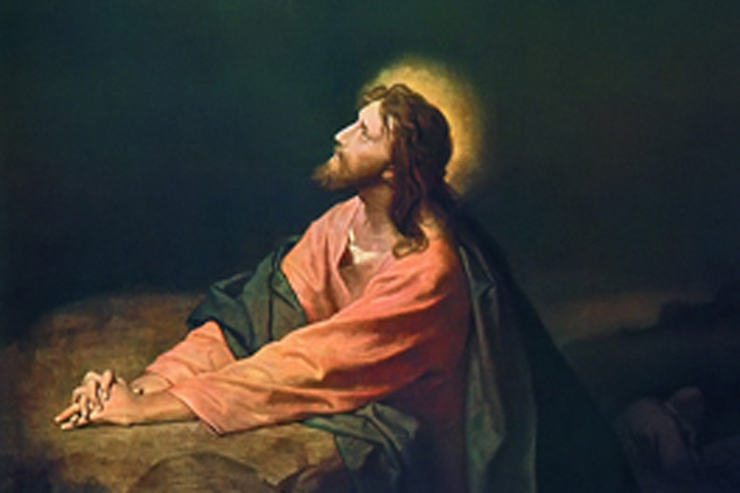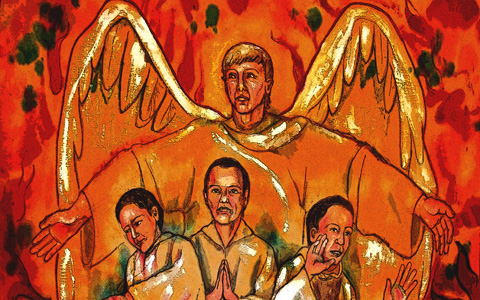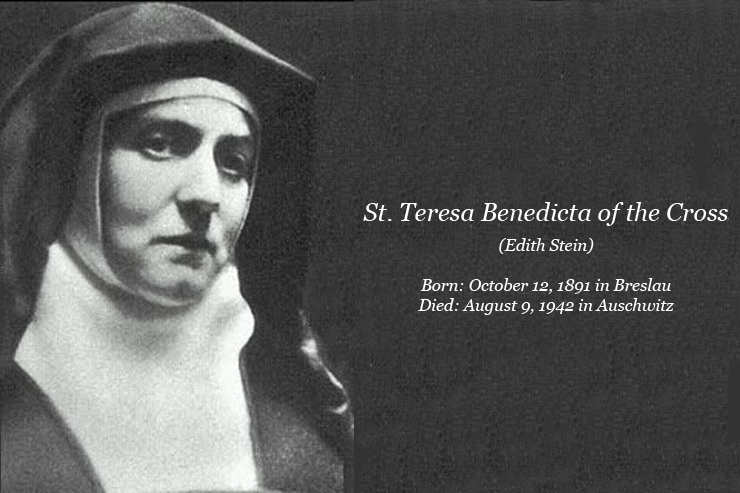Over the past dozen years I’ve had the amazing and accidental opportunity to do something few Christians get to do: dive deeply into both the Catholic and Evangelical worlds. That experience has been enlightening, confusing, encouraging, frustrating and inspiring all at once. As a result, I’ve arrived at 12 realizations that surprised me about each side of Christianity, and the overlap between them.
Before getting into those realizations, I thought I should explain a little about who I am and how I arrived at them, in the hope that it will demonstrate that the ideas I present here are born out of love for God, a desire for greater unity among all Christians, and affection for the wonderful people I’ve met as a result of this experience.
In terms of my faith, I am a self-described “traditional, evangelical Catholic.” I’m also a husband, father of four boys, consultant, author and speaker on matters related to leadership and teamwork. In 2003, I was invited to speak at something called the Willow Creek Leadership Summit, a huge event sponsored by and held at a non-denominational mega-church outside Chicago. The experience led me to be invited to speak at many similar Christian events, and to consult to a wide variety of groups, organizations and denominations in the evangelical world. It also allowed me to meet many of the most prominent pastors and thinkers around the country, and become good friends with quite a few of them. This has been a great blessing for me.
Somewhere in the midst of all that I volunteered to do some leadership and management training in the Catholic world, and thankfully, God began opening doors for me there too. I’ve had the opportunity to speak or consult to a surprising number of bishops, priests, parishes and religious orders, and serve a wide variety of Catholic organizations. Additionally, I’ve become friends with many Catholic clergy, thinkers and leaders, most of whom I had never heard of just a decade ago. Again, this has been a great blessing.
In the process of all this I found myself surprised again and again by what I was learning. Some of my observations here will be surprising to you, though others certainly will not, depending on where you find yourself in the Christian world. I present them here in raw, unedited form, out of love for Christ and His followers.
Surprise #1: Evangelicals generally know their Bible better than most Catholics.
Okay, I know that this one isn’t all that surprising to most people, but I mention it here because I had only heard about it and had never really seen it up close until the past dozen or so years. Now, when I say, “know their Bible”, I’m referring specifically to reading, studying and committing it to memory, all of which are important in order for us to live as Christ wants us to live, and to share Him with others. As St. Jerome once said sometime during the 4th Century, “Ignorance of scripture is ignorance of Christ.” I’m glad to have been reminded of this by my evangelical friends.
Surprise #2: Catholics know the Bible better than they realize.
If that sounds like a contradiction of the previous point, stay with me here. Catholics – and by that I mean the practicing ones who go to Mass at least once a week – have been regularly exposed to the Bible throughout their lives, sometimes without knowing it. Of course, the weekly reading of the Gospel, the Psalms, and the Old and New Testaments on Sundays amounts to a fair amount of Bible exposure, which I always took for granted. Though I can’t cite Biblical verses very well, I’m realize now that I was more familiar with them than I had thought.
But more than that, virtually every element of the Mass is Biblical. I can honestly say that I didn’t know or understand this until the past few years. And if I didn’t know it, why would I expect my wonderful evangelical friends to know it? Yes, throughout my life, I’ve been exposed to more Biblical practices and principles every Sunday than I realized. Now that it has been explained to me, my thirst for understanding the Bible has grown, and I’ve incorporated more Bible study and reading beyond what I do on Sundays, something that more and more Catholics are beginning to do.
Surprise #3: Evangelicals put more emphasis on having a personal relationship with Jesus than many Catholics do.
Again, this may not be a big surprise, but to learn it first hand was something of a realization for me. For a variety of reasons, many practicing Catholics seem to be somewhat hesitant in this area. It isn’t that they don’t believe God is love and mercy, and that Christ is His Son and our Savior. They do. It’s just that the idea of knowing Him intimately, as a friend, seems soft or unattainable to them. My evangelical brothers and sisters are more comfortable with this, and they talk about it more. I love that about them.
Surprise #4: Many of the people I’ve met who seem to have the closest personal relationship with Jesus are Catholics.
I didn’t expect this. Many of the people I’m talking about here are priests and nuns, and many others are converts to Catholicism. Let’s take the priests and nuns I’ve met first.
I’ve been shocked to learn that there are so many devout religious men and women in the Catholic world who know Jesus intimately, even if they are virtually invisible or unknown to most of us. Like many of the saints who preceded them throughout the centuries, they live quiet lives of relative obscurity, and are almost never well known for preaching and teaching. Instead, they serve in more practical, unspectacular ways, often within the context of a religious order.
After almost forty years of being a practicing Catholic, I didn’t even realize that these people existed! Which says more about where my head and heart were than anything else. The fact is, most Catholics don’t really know many priests or nuns well enough to understand the depth of their faith. Their interactions are often limited to saying hello to them after Mass. And beyond diocesan priests, many, many Catholics, and most non-Catholics, don’t even understand what religious orders are, which is to miss out on a significant source of holiness in the world.
As for the converts to Catholicism, it shouldn’t be a surprise that they have such deep relationships with Jesus because they came from places that taught and emphasized knowing Christ. They certainly didn’t leave that behind when they became Catholic, thanks be to God. But they did seem to add a contemplative, Sacramental element to their less formal relationship with Jesus, and I’ve found that combination to be stunning.
Surprise #5: Catholics become Evangelicals for a variety of reasons.
Most of the people I know who have stopped going to Catholic Mass and now attend evangelical-protestant services tell me they do so for one or more of three reasons: they were bored and uninspired by homilies at Mass, they felt unknown in their Catholic parishes, or they didn’t want to live according to the moral teachings of the Catholic Church. Let’s look at the first two reasons first, because they’re related.
Many of the bored and uninspired say the same thing: “I wasn’t being fed.” They wanted more energetic, passionate and relevant preaching on Sundays, and who can blame them? They were drawn to their new congregations by better sermons, and kept there by gregarious groups of people who built welcoming communities and more compelling activities for them, like Bible study, youth groups and small groups.
And then there are some who left their Catholicism because they wanted a different set of moral guidelines that fit their chosen lifestyles, especially around sexuality and marriage. They went in search of churches that didn’t require them to change the way they lived their lives or conform to rules that were poorly taught or inconvenient.
Surprise #6: Evangelicals join the Catholic Church primarily for one, completely different reason.
The majority of people I’ve met who have become Catholic, and I’ve met many over the past decade, site their attraction to the Sacraments, their belief that the Eucharist is the Real Presence of Christ, and their conviction that the Catholic Church is the original one that Jesus meant to establish. In other words, they come for deeply doctrinal and theological reasons, usually after considerable study and contemplation. They are well aware that Catholic parishes generally (but not always) have less engaging sermons and poorer fellowship programs. They come in spite of that (and thankfully, with the hope of improving it).
Something else I’ve found surprising is that of the converts to Catholicism I’ve met, many have been ministers and theologians and people who worked closely with evangelical organizations. I’m happy to say that virtually none of them speak derisively of their experience as evangelicals, but are grateful for how they were formed in their faith and first came to know Christ through that experience. They don’t feel like they’ve left their faith behind, but rather added to it.
Surprise #7: Evangelicals who become Catholics incur much greater cost than those who go the other way.
Most of the former Catholics I’ve met encountered relatively little formal backlash for choosing to attend evangelical churches. Aside from the possible disappointment of a parent or older relative, most of them made the shift with little difficulty or fanfare. Few of them had to leave behind friendships or jobs as a result.
On the other hand, I’ve been amazed at the cost that converts to Catholicism have been willing to incur, either in the loss of secure employment (pastors, ministers and church employees), or the disappointment they face from non-Catholic friends and family who are often quite surprised by their conversion. It is no wonder that converts arrive knowing Catholicism so well; only people with extremely compelling reasons would take such a difficult step.
Surprise #8: Evangelicals know a lot less about the Catholic Church than I thought.
I have been stunned at how little most of my non-Catholic friends know about Catholicism. I don’t make this statement as a criticism, but rather as a simple observation, one that I hadn’t expected. Even most of the pastors and church employees I know have a surprisingly limited understanding of Catholic Church history and teaching. They tell me that much of their training touched lightly on Catholicism, and even then often as a means of gently refuting it. I’ve learned that much Church history is foreign to them, especially anything relating to the Church Fathers (who I only recently learned about) and the Saints.
I was initially disappointed by this, but that disappointment has become a source of hope because I am finding that so much of what my evangelical friends think about Catholicism is incomplete. Their objections to Catholicism are the simple ones, which are easy to correct, even for a “baby-Catholic” like me: Catholics don’t worship Mary but honor her; we don’t pray to saints, per se, but ask them to pray with us just as we would ask a good friend; statues are not idols but simple reminders, like photographs of loved ones who have passed away; rote prayers like the Rosary are not about babbling empty words, but about coming into communion with God through deep contemplation of Christ’s life; the Sacraments are Biblical.
Something else that caught me off guard has been the surprise among my evangelical friends as they come to the realization that many priests, nuns and devout Catholics are actually deeply spiritual, thoughtful, truth-seeking followers of Christ, not adherers to ritual-for-the-sake-of-ritual. This doesn’t fit the assumptions they’ve made innocently for much of their lives.
All of this reminds me of what Archbishop Fulton Sheen once said: “There are only a handful of people who hate the Catholic Church. There are millions who hate what they mistakenly think about the Catholic Church.” In the past ten years, I have become utterly convinced that he was right. That’s not to say that my evangelical friends ever hated the Catholic Church. Not at all. They’re often just uninformed. But as more and more people outside of Catholicism get exposure to the Catholic Church, their objections to it seem to be diminishing.
Surprise #9: Catholics know less about Evangelical-Protestantism than I had thought, and a lot less about the Catholic Church too.
That’s right. Many practicing Catholics don’t understand the heart of what it means to be Catholic, and so it would stand to reason that they don’t know much about what goes on in the various denominations of Evangelical-Protestantism.
As for their ignorance of the Catholic Church, I’ve come to realize that they are victims of fifty years of poor teaching, and a secular culture that generally discourages weighty things like prayer, reading, research and pondering. An hour a week at Mass doesn’t make up for a poor foundation, and too many Catholics limit their religious education to that single hour. Though many of them have an intuitive sense that there is something special about the Catholic Church, most can’t describe it for themselves, and they certainly can’t explain it to curious friends.
Of all the people who have taught me about my Catholic faith during the past ten years, a disproportionate number of them have been converts or reverts to Catholicism. So many evangelicals who convert marvel at how little their new Catholic brothers and sisters understand about the beauty of their own faith.
And as for Catholics knowing little about Evangelical-Protestantism, it turns out that this isn’t really a surprise at all. As my non-Catholic friends have shown me, many evangelicals are confused by the many denominations and varieties of Protestantism too. Understanding the difference between a Presbyterian, a Baptist, a Four Square Christian and a non-denominational Christian is tough for even the most studied theologian.
One of the things that surprised me most about Evangelical-Protestantism is the range of liturgies or worship styles, not only from one denomination to another, but even within denominations. I have Presbyterian pastor friends who have services with virtually no formal, liturgical practices, spending most of the service preaching, and others whose services closely resemble the Catholic Mass. Most of my friends who attend these churches seem just as confused by or unaware of the variations as I am.
Surprise #10: Evangelicals and Catholics don’t talk enough about their faiths.
Don’t misunderstand me. I don’t mean that we don’t talk about Jesus or our faith enough in general, though that may well be the case. I mean that we don’t talk about Him and about our faith with one another. Too often, Catholics and evangelicals become uncomfortable, afraid, polite or even a little defensive when they meet up with someone from “the other side”. I know that I had many of those feelings when I first became immersed in both sides of the Christian world. Which was probably why, in spite of the wonderful experience I was having, I sometimes felt frustrated.
But as I’ve learned more and more about why I am a follower of Christ, I have come to let go of that discomfort. My motivation for talking to my brothers and sisters about Jesus, the evangelical ones and the Catholic ones alike, is guided by love and a search for His truth, more than it has ever been. And it is a wonderful, liberating feeling.
Surprise #11: The desire for and openness to Christian unity is much greater than I had thought.
I am convinced of and grateful for this. It has become clear to me that followers of Jesus want to be one, as Jesus called us to be one. The more they see a world in need of Him, the more they realize that we are making it harder than necessary for people to come to Him because of the myriad differences that confuse and discourage “seekers.” Today, more Catholics are praying with their evangelical brothers and sisters than ever, and more evangelical brothers and sisters are warming to the pope and the teachings of the Church he leads. We are listening to one another’s music and adopting one another’s ways of better living as Christ wants us to live. Praise God for that! (that didn’t sound very Catholic, did it?)
Surprise #12: The obstacles to unity are largely based on pride and history.
Don’t get me wrong. Pride and history are difficult foes. To downplay them is to get crushed by them. Still, based on my many conversations, observations and realizations during the past dozen years, I can’t escape the surprising conclusion that the many divisions in the Christian world are almost exclusively a result of human frailty and fear. I’m convinced of that. The only way to bridge these divides is to pray more to be unified, to be open to the promptings of the Holy Spirit in that process, and to die to ourselves and submit all things to Him.
~~~~~
I have written this essay in that spirit, though I must confess to not knowing exactly how unity among Christians will proceed. I’ll start with myself, and pray that this essay, and whatever else I do, pleases God. And I’ll thank Him for all the wonderful people I’ve met over the past twelve years who have brought me closer to Him.














